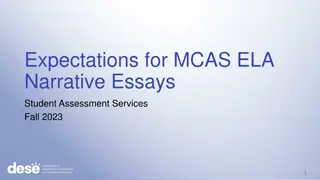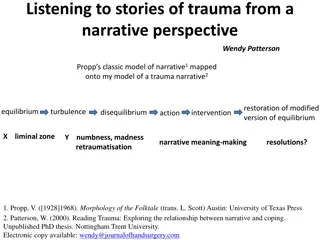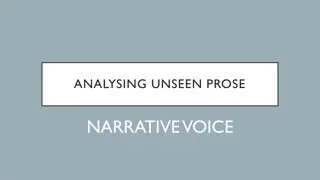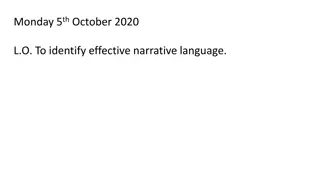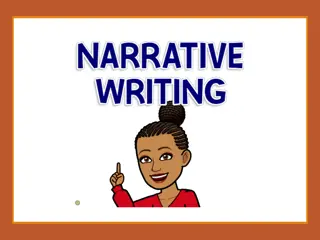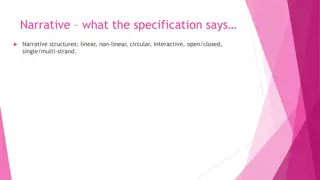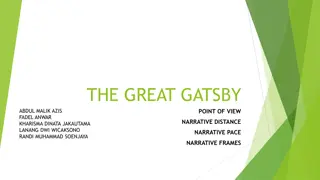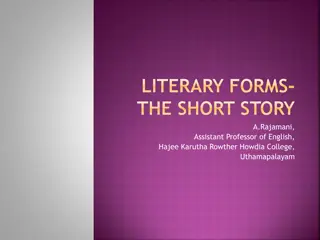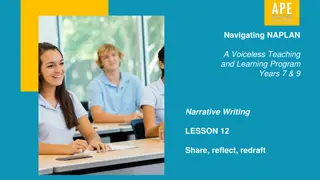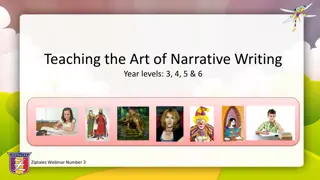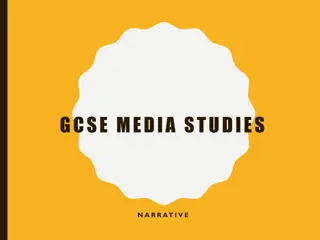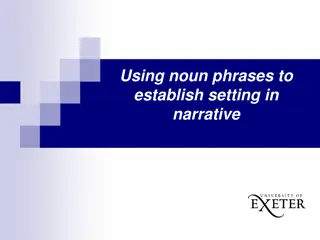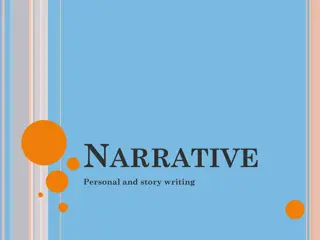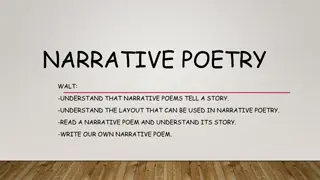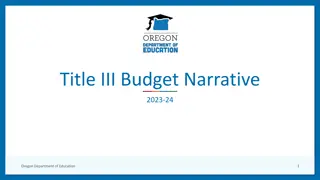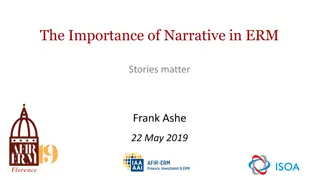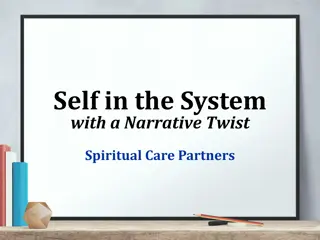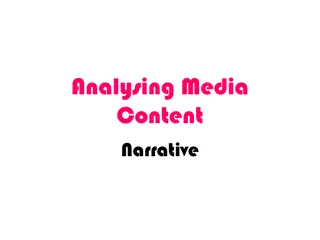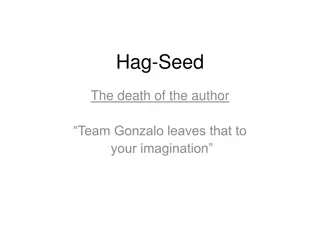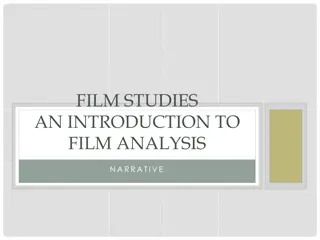MCAS ELA Narrative Essay Expectations and Examples
Learn about the expectations for MCAS ELA narrative essays, including guidelines for idea development and conventions. Find out how to score well by responding in the correct writing mode and avoiding common mistakes. Explore examples of lower-score responses and how to improve them. Download sample
3 views • 10 slides
Understanding Trauma Narratives: A Narrative Perspective
Exploring trauma narratives through the lens of Wendy Patterson Propp's classic narrative model, this study delves into the restoration of equilibrium, the disruption of disequilibrium, and the intervention actions within the liminal zones of trauma narratives. It emphasizes narrative meaning-making
5 views • 5 slides
Evolution of Mathematical Theories and Proof Systems
Development of mathematical theories such as model theory, proof theory, set theory, recursion theory, and computational complexity is discussed, starting from historical perspectives with Dedekind and Peano to Godel's theorems, recursion theory's golden age in the 1930s, and advancements in proof t
1 views • 29 slides
Understanding Narrative Perspective in Unseen Prose Narratives
Explore the narrative voice in unseen prose narratives through the analysis of different narrative perspectives, such as homodiegetic and heterodiegetic narrators. Understanding these terms helps in interpreting the impact of perspective on storytelling and themes in literary texts for exam preparat
1 views • 17 slides
Exploring Effective Narrative Language for Writing Success
Delve into the art of crafting compelling narratives by identifying and utilizing effective narrative language techniques. Explore the elements that make a good narrative, practice identifying literary techniques, and understand the impact of figurative language on storytelling. Enhance your writing
0 views • 42 slides
Psychological Theories of Criminality: Understanding the Roots
Psychological theories of criminality delve into the association between intelligence, personality, learning, and criminal behavior. Major theories include Psychodynamic Theory by Freud, Behavioral Theory by Bandura, and Cognitive Theory by Kohlberg. These theories explore how unconscious mental pro
1 views • 20 slides
Exercise in Narrative Style Transformation
Practice transforming narrative styles in storytelling through a series of examples where dialogues are rewritten into narratives. The exercises focus on changing direct speech into indirect speech while maintaining the essence of the original conversations. Each task presents a scenario followed by
1 views • 26 slides
Mastering Narrative Writing: Techniques and Sequences
Enhance your narrative writing skills by engaging readers with compelling characters and settings, developing well-structured event sequences, and utilizing descriptive details and narrative techniques effectively. Explore different points of view and learn to create engaging narratives that captiva
1 views • 23 slides
Understanding Narrative Research Design in Qualitative Research
Narrative research is a qualitative research approach that focuses on sharing individuals' stories. Researchers collect and interpret personal narratives to understand individual experiences. Key characteristics, data collection methods, steps, and ethical considerations in narrative research are ex
0 views • 20 slides
Understanding Narrative Structures in Media: Linear vs. Non-Linear
Explore the concepts of linear and non-linear narrative structures in media storytelling, analyzing how they are used to engage audiences effectively. Dive into well-known stories like Alice in Wonderland, Hansel and Gretel, and Jack and the Beanstalk to understand the difference between narrative a
0 views • 17 slides
Understanding Narrative Elements in "The Great Gatsby
Explore the narrative elements in "The Great Gatsby" such as point of view, narrative distance, and narrative pace. The novel is analyzed from chapters 5 to 9, focusing on Nick Carraway's first-person perspective and the small narrative distance, which adds realism to the story.
0 views • 11 slides
Understanding the Theory of Firms: Neoclassical vs. Modern Approaches
The theory of firms is explored through the Neoclassical and Modern perspectives. Neoclassical theory focuses on profit maximization, while Modern theory delves into managerial, principal-agent, and transaction cost theories. The discussion covers criticisms of Neoclassical theory and the essential
1 views • 79 slides
Theories of Causation in Psychological and Social Sciences
Overview of theories of causation categorized into psychological, social psychological, and sociological perspectives. Psychological theories focus on instinctive, biological, and psychological qualities of abusers, including Attachment Theory, Psychodynamic Theory, Social Learning Theory, and Situa
0 views • 15 slides
Understanding Narrative Techniques for Effective Storytelling
Explore different narrative techniques like first-person perspective, flashback, framed narrative, foreshadowing, and in medias res to enhance your storytelling skills. Learn how these techniques can bring depth and complexity to your narratives, captivating your audience with engaging storytelling
3 views • 13 slides
Understanding Political Theory through a Contextual Approach
Exploring G.H. Sabine's perspective on political theory through a contextual approach, emphasizing the importance of historical context and societal influences. Sabine argues that while political theory evolves with its contemporary politics, it should be analyzed within its specific time and social
0 views • 9 slides
Understanding the Art of the Short Story
A short story is a concise narrative that captivates readers with a focused theme and structured plot. This literary form demands unity of purpose and a single informing idea, distinguishing it from a novel. Various perspectives exist on the composition of a short story, with debates on its length,
1 views • 10 slides
Evolution of Light Theory: From Wave Theory to Quantum Theory
At the turn of the century, the discovery of the photoelectric effect challenged the wave theory of light, leading to the development of the quantum theory by Max Planck and Albert Einstein. This new theory introduced the concept of discrete energy units known as quanta, bridging the gap between wav
1 views • 62 slides
NAPLAN Year 7 & 9 Narrative Writing Lesson: Share, Reflect, Redraft
Explore a voiceless teaching program for NAPLAN Years 7 & 9 narrative writing in Lesson 12. Dive into assessment criteria, NAPLAN minimum standards for Year 7 and 9, and resources from the National Assessment Program. Enhance your narrative writing skills through sharing, reflection, and redrafting.
0 views • 5 slides
Mastering Narrative Writing: Tips for Year Levels 3-6
Dive into the art of narrative writing focusing on Year Levels 3 to 6. Explore the importance of narratives in children's lives, the inclusion of narrative in the Australian Curriculum, understanding what truly constitutes a story, and engaging activities to spark creativity in students.
0 views • 25 slides
Understanding Narrative Stories and Plot Structure
A narrative text is a story composed of various elements such as characters, setting, conflict, events, climax, and resolution. The structure of a narrative story can be dissected into parts like beginning, middle, and end, each serving a specific purpose in storytelling. By plotting the story on a
0 views • 13 slides
Understanding Narrative Theory and Character Roles in Media Studies
Dive into the world of narrative theory and character roles in media studies, exploring the plot development, universal structures, and the significance of character types such as the hero, villain, donor, and more. Discover how these elements shape storytelling in various forms of media, from films
1 views • 17 slides
Dp-branes, NS5-branes, U-duality, and M-Theory Overview
Overview of Dp-branes, NS5-branes, and U-duality derived from nonabelian (2,0) theory with Lie 3-algebra. Introduction to M-theory, including M2-branes and M5-branes in the strong coupling limit. Discussion on BLG theory, Lorentzian Lie 3-algebra, and the ABJM theory for M2-branes.
1 views • 32 slides
Exploring Setting Through Noun Phrases in Narrative Descriptions
Establishing setting in narrative through the use of descriptive noun phrases is crucial for creating a vivid and immersive atmosphere. By carefully selecting and arranging nouns, authors can evoke specific moods and engage readers in a detailed visual experience. This approach enhances the overall
1 views • 6 slides
Intriguing Narrative Journey
The session explores narrative writing, correcting sentences into past tense, discussing opening lines, successful narrative ingredients, and a gripping excerpt. Engage with the power of storytelling and honing writing skills through creative challenges and analysis.
0 views • 73 slides
Understanding Time-Independent Perturbation Theory in Quantum Mechanics
Perturbation theory is a powerful tool in solving complex physical and mathematical problems approximately by adjusting solutions from a related problem with known solutions. This theory allows for more accurate approximate solutions by treating the difference as a small perturbation. An example inv
0 views • 19 slides
Ethical Theories: Divine Command vs. Virtue Theory Explained
Divine Command Theory asserts that morality is derived from God's commands, contrasting with Virtue Theory which focuses on developing moral virtues to achieve human flourishing and excellence. Divine Command Theory relies on religious texts, while Virtue Theory emphasizes the cultivation of virtues
0 views • 24 slides
Mastering Narrative Writing: Techniques and Tips
Dive into the world of narrative writing with this comprehensive guide! Learn the nuances of crafting fictional and personal stories, explore dialogue techniques, understand the structure of a narrative, and enhance your writing with impactful vocabulary. Whether you're a beginner or seeking to refi
0 views • 20 slides
Understanding Fermi Liquid Theory in Interacting Fermion Systems
Fermi liquid theory, also known as Landau-Fermi liquid theory, is a theoretical model that describes the normal state of metals at low temperatures. Introduced by Landau and further developed by Abrikosov and Khalatnikov, this theory explains the similarities and differences between interacting ferm
0 views • 23 slides
Dive into Narrative Poetry
Explore the essence of narrative poetry by understanding its storytelling nature, layout, features, and common poetry techniques. Delve into an example poem, "Skippy the Naughty Kangaroo," to grasp the main characters, narrative elements, and the story it conveys. Through this journey, you'll enhanc
0 views • 11 slides
Budget Narrative for Title III Grants in Oregon Education 2023-24
This budget narrative outlines the goals of Title III grants for the Oregon Department of Education, focusing on aiding English learners in attaining language proficiency and academic achievement. It emphasizes the importance of Supplement not Supplant regulations to ensure proper fund allocation an
0 views • 38 slides
Computational Learning Theory: An Overview
Computational Learning Theory explores inductive learning algorithms that generate hypotheses from training sets, emphasizing the uncertainty of generalization. The theory introduces probabilities to measure correctness and certainty, addressing challenges in learning hidden concepts. Through exampl
0 views • 43 slides
Automata Theory and Theory of Computation Overview
This course overview covers concepts in automata theory and theory of computation, including formal language classes, grammars, recognizers, theorems in automata theory, decidability, and intractability of computational problems. The Chomsky hierarchy, interplay between computing components, modern-
0 views • 42 slides
The Power of Narrative in ERM and Economics
Narrative plays a crucial role in risk management, as it helps in better understanding and decision-making. The use of stories in risk dashboards and economic narratives can convey complex information effectively. Robert Shiller's concept of narrative economics explores how popular stories impact ec
0 views • 27 slides
Theories of Interest in Microeconomics II
Explore various theories of interest in economics, including the Classical Theory, Liquidity Preference Theory by Keynes, Productivity Theory, Abstinence Theory, Time-Preference Theory, Fisher's Time Preference Theory, and the Loanable Fund Theory. These theories offer different perspectives on the
0 views • 6 slides
Exploring the Evolution of Atomic Theory
Delve into the historical journey of atomic theory starting from Democritus and Aristotle's views to modern advancements proving some aspects of Dalton's theory incorrect. Learn about key laws and theories such as the Particle Theory of Matter, Dalton's Atomic Theory, and JJ Thomson's discoveries, s
0 views • 30 slides
The Intergenerational Family Narrative: Unraveling Complex Relationships
Exploring the intricate family dynamics of Ben Franklin and his lineage reveals a saga of estrangement, bitter conflicts, and attempts to find companionship across generations. Through the lenses of Family Systems Theory and Narrative Theory, the story unfolds with themes of abandonment, attachment,
0 views • 37 slides
Understanding Narrative Structures in Media Content
Narrative in media content involves how stories are told, focusing on structure and conventions. Key elements include Todorov's narrative theory, basic narrative structures, and Propp's character spheres of action, all of which shape the way stories unfold in films and other media.
0 views • 13 slides
Exploration of Literary Theory: Death of the Author in "Hag-Seed" and "Team Gonzalo
Explore the concept of the death of the author in literature through the works "Hag-Seed" and "Team Gonzalo." Delve into Roland Barthes' theory, which separates the author from the text, emphasizing the role of the reader in interpreting meaning within the narrative. Witness how this theory is demon
0 views • 7 slides
Exploring Narrative in Film Studies: An Introduction to Film Analysis
Shots in film and television are crucial in storytelling, forming the narrative that can be dissected into plot and discourse. The plot revolves around events and character development, while discourse focuses on how the story is conveyed. Narrative theory, highlighted by Propp's character roles, pr
0 views • 11 slides
Macromechanical Analysis of Lamina and Tsai-Hill Failure Theory Overview
The Tsai-Hill failure theory is based on the strengths of a unidirectional lamina, incorporating longitudinal and transverse tensile and compressive strengths, as well as in-plane shear strength. This theory, derived from the distortion energy theory, provides criteria for determining lamina failure
0 views • 15 slides
